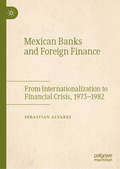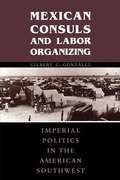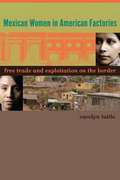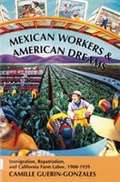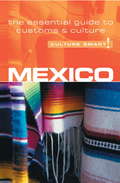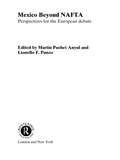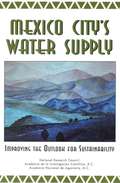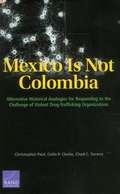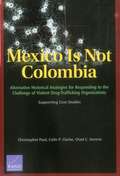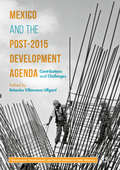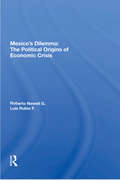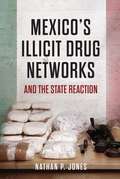- Table View
- List View
Mevrouw Schouten
by Nicolien Van Halem C. OttenZorgcategorie: Kraamvrouw Setting: KraamafdelingKorte inhoud: Bij de meeste vrouwen verlopen de zwangerschap, de bevalling en de kraamperiode zonder problemen, maar niet bij alle. Hanneke Schouten is zo'n vrouw. In de loop van de zwangerschap moet zij steeds meer rekening houden met gezondheidsproblemen. Een geplande thuisbevalling wordt verplaatst naar het ziekenhuis en ook de bevalling en de eerste uren daarna verlopen niet zonder problemen. Hierdoor is ook het kraambed anders en op een andere locatie dan Hanneke en haar man van tevoren bedacht hadden.
Mexican Banks and Foreign Finance: From Internationalization to Financial Crisis, 1973–1982
by Sebastian AlvarezThis book is one of the first historical revisions of the Latin American debt crisis of 1982, exploring recently disclosed archival sources for a number of creditor and debtor institutions. It fills a gap on the national and international historiography on international finance in the 1970s and the Latin American debt crisis of the 1980s. The domestic banking approach in revisiting the 1982 financial crisis is a main distinction of this work and the consequences of the involvement of Mexican banks in international finance a major contribution to the literature. Beyond its thoroughly international approach, the book addresses a broad array of disciplines: financial history, political economy, international relations and business history. While the focus is on financial crisis, its implications extend to current regulatory and financial policy relative to crisis and non-crisis matters. In addition to providing a template for understanding other instances of financial crisis, the book points the way to research in a wide range of additional questions. These include the economic role of foreign capital, the transmission of financial crisis, and the decision criteria of states during crises. It also offers a strong example of the importance of politics in resolving economic problems. Because of this, the book will be of interest to historians, economists and political scientists.
Mexican Consuls and Labor Organizing: Imperial Politics in the American Southwest
by Gilbert G. GonzálezChicano history, from the early decades of the twentieth century up to the present, cannot be explained without reference to the determined interventions of the Mexican government, asserts Gilbert G. González. In this pathfinding study, he offers convincing evidence that Mexico aimed at nothing less than developing a loyal and politically dependent emigrant community among Mexican Americans, which would serve and replicate Mexico's political and economic subordination to the United States.<P><P> González centers his study around four major agricultural workers' strikes in Depression-era California. Drawing on a wide variety of sources, he documents how Mexican consuls worked with U.S. growers to break the strikes, undermining militants within union ranks and, in one case, successfully setting up a grower-approved union. Moreover, González demonstrates that the Mexican government's intervention in the Chicano community did not end after the New Deal; rather, it continued as the Bracero Program of the 1940s and 1950s, as a patron of Chicano civil rights causes in the 1960s and 1970s, and as a prominent voice in the debates over NAFTA in the late 1980s and early 1990s.
Mexican Farmworkers in the United States
by Jonathan Schlefer Forest L. ReinhardtIndustry and Background Note
Mexican Multinationals: Building Multinationals in Emerging Markets
by Alvaro Cuervo-Cazurra Miguel A. MontoyaOver the past two decades, emerging market multinationals have become an important force in international business. This book provides a better understanding of the actions and strategies used by firms from mid-sized emerging markets to upgrade their capabilities and become successful multinationals. It is the first book to provide an in-depth look at Mexican multinationals, or 'Multimexicans'. These include some of the leading firms in the world, such as the construction materials producer Cemex and the tortilla maker Grumasa, as well as smaller but innovative firms such as the theme park Kidzania and the cinema multicomplex Cinepolis. This comprehensive analysis contains case studies written by local industry experts on these and other firms, across twenty-two industries. The lessons drawn will be of interest to researchers, students, and consultants, as well as managers and executives of firms in other emerging markets looking to upgrade capabilities and expand abroad.
Mexican Women in American Factories: Free Trade and Exploitation on the Border
by Carolyn TuttlePrior to the millennium, economists and policy makers argued that free trade between the United States and Mexico would benefit both Americans and Mexicans. They believed that NAFTA would be a “win-win” proposition that would offer U. S. companies new markets for their products and Mexicans the hope of living in a more developed country with the modern conveniences of wealthier nations. Blending rigorous economic and statistical analysis with concern for the people affected, Mexican Women in American Factories offers the first assessment of whether NAFTA has fulfilled these expectations by examining its socioeconomic impact on workers in a Mexican border town. Carolyn Tuttle led a group that interviewed 620 women maquila workers in Nogales, Sonora, Mexico. The responses from this representative sample refute many of the hopeful predictions made by scholars before NAFTA and reveal instead that little has improved for maquila workers. The women’s stories make it plain that free trade has created more low-paying jobs in sweatshops where workers are exploited. Families of maquila workers live in one- or two-room houses with no running water, no drainage, and no heat. The multinational companies who operate the maquilas consistently break Mexican labor laws by requiring women to work more than nine hours a day, six days a week, without medical benefits, while the minimum wage they pay workers is insufficient to feed their families. These findings will make a crucial contribution to debates over free trade, CAFTA, and the impact of globalization.
Mexican Workers and American Dreams: Immigration, Repatriation, and California Farm Labor, 1900-1939 (Class And Culture)
by Camille Guerin-GonzalesIn the first forty years of this century, over one million Mexican immigrants moved to the United States, attracted by the prospect of farm work in California. They became workers in industrial agriculture --barely recognized, never respected, and poorly paid. Native white American workers did not resent the Mexicans during prosperous times, when everyone who wanted to work could do so. But during the Great Depression, native workers began to realize that many of the Mexican workers were here to stay. <p><p> Native workers, blaming their unemployment on the immigrants, joined with government officials to demand that Mexican workers and their families return to Mexico. During the 1930s, the federal government and county relief agencies cooperated in a nasty repatriation program, forcing half a million Mexicans living in the U.S. to return to Mexico. <p> Camille Guerin-Gonzales tells the story of their migration, their years here, and of the repatriation program--one of the largest mass removal operations ever sanctioned by the U.S. government. She documents both their efforts to resist and the overpowering forces that worked against them.
Mexico (C): Reform and Crisis--1987-95
by Huw PillDescribes the evolution of the Mexican economy and its relation with the international capital markets in the period leading up to the Peso crisis of December 1994. Emphasizes the role of "Washington consensus" policies in stimulating the inflows, and the inability of the Mexican banking system to intermediate them efficiently.
Mexico - Culture Smart!
by Guy MavorCulture Smart! provides essential information on attitudes, beliefs and behavior in different countries, ensuring that you arrive at your destination aware of basic manners, common courtesies, and sensitive issues. These concise guides tell you what to expect, how to behave, and how to establish a rapport with your hosts. This inside knowledge will enable you to steer clear of embarrassing gaffes and mistakes, feel confident in unfamiliar situations, and develop trust, friendships, and successful business relationships.Culture Smart! offers illuminating insights into the culture and society of a particular country. It will help you to turn your visit-whether on business or for pleasure-into a memorable and enriching experience. Contents include* customs, values, and traditions* historical, religious, and political background* life at home* leisure, social, and cultural life* eating and drinking* do's, don'ts, and taboos* business practices* communication, spoken and unspoken"Culture Smart has come to the rescue of hapless travellers." Sunday Times Travel"... the perfect introduction to the weird, wonderful and downright odd quirks and customs of various countries." Global Travel"...full of fascinating-as well as common-sense-tips to help you avoid embarrassing faux pas." Observer"...as useful as they are entertaining." Easyjet Magazine"...offer glimpses into the psyche of a faraway world." New York Times
Mexico Beyond NAFTA
by Lionello F. Punzo Martín Puchet AnyulWith European Monetary Union well underway, Europe is starting to look at nearby countries and culturally closer continents to define its strategies for the future. In this book, chapters by leading Mexican economists are matched with reactions from European colleagues. They offer a novel viewpoint on the critical assessment of the North American F
Mexico City Water Shortage
by Regina Garcia-Cuellar John D. Macomber Griffin H. James Frederik NellemannIn this case, a property company, a water privatizer, and municipal engineers explore the causes of and solutions to a severe water shortage in Mexico City, a great global capital. The protagonist is a real estate investor doing due diligence on the magnitude of the crisis, the impact on the firm's operations, and the likelihood of resolution. Due diligence includes interviews with city water officials and global-scale water privatizers. This case is an excellent introduction to city scale infrastructure issues on a global level. A related case, "Water Shortage and Property Investing in Mexico City," HBS No. 210-085, contains more real estate finance and less water infrastructure finance material than this case does.
Mexico City's Water Supply: Improving the Outlook for Sustainability
by The Joint Academies Committee on the Mexico City Water SupplyThis book addresses the technical, health, regulatory, and social aspects of ground water withdrawals, water use, and water quality in the metropolitan area of Mexico City, and makes recommendations to improve the balance of water supply, water demand, and water conservation. The study came about through a nongovernmental partnership between the U.S. National Academy of Sciences National Research Council and the Mexican Academies of Science and Engineering. The book will contain a Spanish-language translation of the complete English text.
Mexico Is Not Colombia: Alternative Historical Analogies for Responding to the Challenge of Violent Drug-Trafficking Organizations
by Christopher Paul Colin P. Clarke Chad C. SerenaDespite the scope of the threat they pose to Mexico's security, violent drug-trafficking organizations are not well understood, and optimal strategies to combat them have not been identified. While there is no perfectly analogous case from history, Mexico stands to benefit from historical lessons and efforts that were correlated with improvement in countries facing similar challenges related to violence and corruption.
Mexico Is Not Colombia: Alternative Historical Analogies for Responding to the Challenge of Violent Drug-Trafficking Organizations, Supporting Case Studies
by Christopher Paul Colin P. Clarke Chad C. SerenaDespite the scope of the threat they pose to Mexico's security, violent drug-trafficking organizations are not well understood, and optimal strategies to combat them have not been identified. While there is no perfectly analogous case to Mexico's current security situation, historical case studies may offer lessons for policymakers as they cope with challenges related to violence and corruption in that country.
Mexico and the Post-2015 Development Agenda
by Rebecka Villanueva UlfgardThis interdisciplinary edited collection presents original analysis on Mexico's transition from the Millennium to the Sustainable Development Goals, departing from three main perspectives. In what areas did Mexico gain leverage and actually contribute to the debate around the proposed SDGs? What are the challenges for Mexico with regard to the SDGs? How to handle the issue of congruence/dissonance in Mexico's accomplishment of the MDGs in relation to the socioeconomic realities on the ground? The contributing authors examine what kind of state is needed to strengthen democratic politics and social justice, but also to improve the economic effectiveness of the state and thereby prospects for development. For Mexico, what is missing is a clear vision for creating a progressive, truly modern society where the notion of a social contract between the government and citizens could be established along the lines of a welfare state that is inclusive, sustainable, and transformative enough to tackle seriously the fundamental socioeconomic injustices dividing Mexicans.
Mexico's Dilemma: The Political Origins Of Economic Crisis
by Roberto Newell G. Luis Rubio F.This book analyzes the crisis Mexico experienced in 1982 on the basis of the historical evolution of Mexico's political and economic structures. The author’s purpose in writing this book is to provide an interpretation of Mexico's current problems in order to analyze what must be done to solve some profound dilemmas and to restructure Mexican society. The main dilemma Mexico faces is its vanishing consensus.
Mexico's Energy Reform
by Richard H.K. Vietor Haviland Sheldahl-ThomasonEnergy - both petroleum and electricity - had been terribly managed for decades in Mexico. The two national monopolies - PEMEX and CFE - were inefficient, overstaffed, corrupt, rife with subsidies, and losing money. Finally, in 2012, President Enrique Pena Nieto announced his intent to drastically reform both. Over the next two years, the Mexican constitution was amended, and a dozen implementing laws were passed, to break up the CFE, reorganize PEMEX, and impose competition between the pieces. By 2017, tracts of offshore oil were auctioned, renewable contracts were auctioned, and new regulators were trying to impose competition downstream in electricity.
Mexico's Illicit Drug Networks and The State Reaction
by Nathan P. JonesMexican drug networks are large and violent, engaging in activities like the trafficking of narcotics, money laundering, extortion, kidnapping, and mass murder. Despite the impact of these activities in Mexico and abroad, these illicit networks are remarkably resilient to state intervention. Drawing on extensive fieldwork and interviews with US and Mexican law enforcement, government officials, organized crime victims, and criminals, Nathan P. Jones examines the comparative resilience of two basic types of drug networks--"territorial" and "transactional"--that are differentiated by their business strategies and provoke wildly different responses from the state. Transactional networks focus on trafficking and are more likely to collude with the state through corruption, while territorial networks that seek to control territory for the purpose of taxation, extortion, and their own security often trigger a strong backlash from the state. Timely and authoritative, Mexico's Illicit Drug Networks and the State Reaction provides crucial insight into why Mexico targets some drug networks over others, reassesses the impact of the war on drugs, and proposes new solutions for weak states in their battles with drug networks.
Mexico's Integration into NAFTA Markets: A View from Sectoral Real Exchange Rates and Transaction Costs
by Rodolphe Blavy Luciana JuvenalA report from the International Monetary Fund.
Mexico, Interrupted: Labor, Idleness, and the Economic Imaginary of Independence (Critical Mexican Studies)
by Sergio Gutiérrez NegrónMexican independence was, in a sense, an economic event. Through economic concerns, elites created a common ground with non-elites in their demands against foreign domination, and independence was imagined by the lettered men of Mexico as a feat that would nationalize a rich and productive economic apparatus. Mexico, Interrupted investigates these economic hopes during the difficult decades between 1821, the year of the country&’s definite separation from Spain, and 1852, a period of political polarization after the US-Mexico War that led the country to the brink of another armed conflict. Drawing on political and popular media, this book studies the Mexican intelligentsia&’s obsession with labor and idleness in their attempts to create a wealthy, independent nation. Focusing on figures of work and its opposites, Mexico, Interrupted reconstructs these decades&’ &“economic imaginaries of independence&”: the political and cultural discourses that structured understandings, beliefs, and fantasies of the relationship between &“the economy&” and the life of an independent polity. By bringing together intellectual history, critical theory, and cultural studies, Gutiérrez Negrón offers a new account of the Mexican nineteenth century and complicates the history of the &“spirit of capitalism&” in the Americas.
Mexico: 2001 Article IV Consultation--Staff Report; Staff Statement; Public Information Notice on the Executive Board Discussion; and Statement by the Executive Director for Mexico
by International Monetary FundA report from the International Monetary Fund.
Mexico: Crisis and Competitiveness
by Aldo Musacchio Richard H.K. Vietor Regina Garcãa-Cuã©llarIn 2010, the bicentennial anniversary of Mexico's revolution against Spain, Mexican President Felipe Calderon hoped he could orchestrate several crucial reforms that Mexico needed. Mexico had not grown much over the course of the last decade, losing competitiveness to China and other Asian countries. Several of its institutions, including labor, education, healthcare, energy, and antitrust, seemed uncompetitive. But with a weaker peso and greater governmental attention to infrastructure, Calderon hoped that Mexico's higher-tech exports could recapture U.S. market share and make headway in Europe and Latin America.
Mexico: Financial Sector Assessment Program Update--Detailed Assessment of Compliance with the Basel Core Principles for Effective Banking Supervision and Transparency of Banking Supervision
by International Monetary FundA report from the International Monetary Fund.
Mexico: Financial Sector Assessment Program Update--Detailed Assessment on the Implementation of the IOSCO Objectives and Principles of Securities Regulation
by International Monetary FundA report from the International Monetary Fund.
Mexico: Narco-violence and a Failed State?
by George W. Grayson* Mexico was named an Outstanding Academic Title of 2010 by Choice Magazine. Bloodshed connected with Mexican drug cartels, how they emerged, and their impact on the United States is the subject of this frightening book. Savage narcotics-related decapitations, castrations, and other murders have destroyed tourism in many Mexican communities and such savagery is now cascading across the border into the United States. Grayson explores how this spiral of violence emerged in Mexico, its impact on the country and its northern neighbor, and the prospects for managing it. Mexico's Institutional Revolutionary Party (PRI) ruled in Tammany Hall fashion for seventy-nine years before losing the presidency in 2000 to the center-right National Action Party (PAN). Grayson focuses on drug wars, prohibition, corruption, and other antecedents that occurred during the PRI's hegemony. He illuminates the diaspora of drug cartels and their fragmentation, analyzes the emergence of new gangs, sets forth President Felipe Calder�n's strategy against vicious criminal organizations, and assesses its relative success. Grayson reviews the effect of narcotics-focused issues in U. S. -Mexican relations. He considers the possibility that Mexico may become a failed state, as feared by opinion-leaders, even as it pursues an aggressive but thus far unsuccessful crusade against the importation, processing, and sale of illegal substances. Becoming a "failed state" involves two dimensions of state power: its scope, or the different functions and goals taken on by governments, and its strength, or the government's ability to plan and execute policies. The Mexican state boasts an extensive scope evidenced by its monopoly over the petroleum industry, its role as the major supplier of electricity, its financing of public education, its numerous retirement and health-care programs, its control of public universities, and its dominance over the armed forces. The state has not yet taken control of drug trafficking, and its strength is steadily diminishing. This explosive book is thus a study of drug cartels, but also state disintegration.

